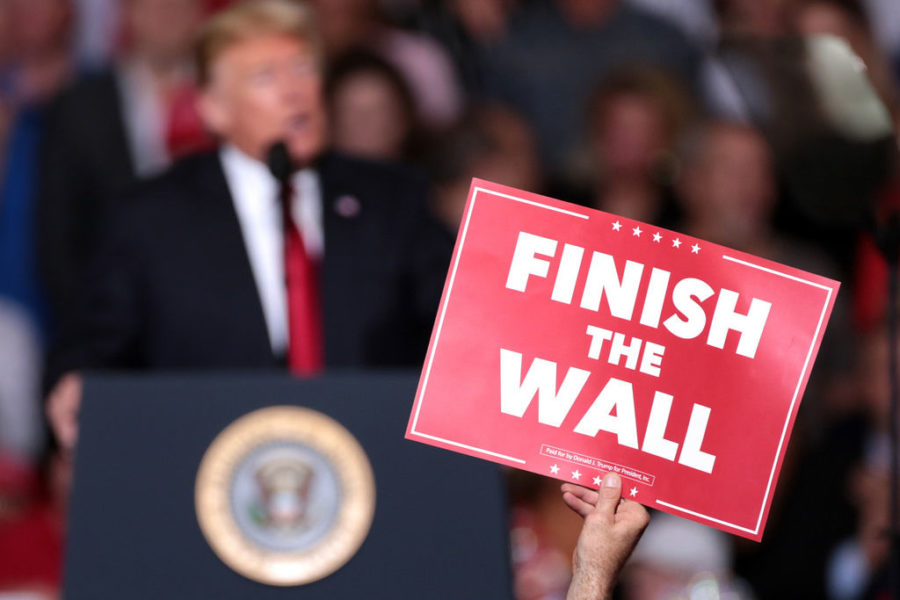Americans disapprove of Trump’s immigration policies
Finish the Wall sign at a Make America Great Again campaign rally for President of the United States Donald Trump at International Air Response Hangar at Phoenix-Mesa Gateway Airport in Mesa, Arizona.
October 30, 2019
In the 2016 election cycle, then-candidate Donald Trump’s talk of building a wall along the U.S.-Mexico border was a major topic of the election, with Trump bringing up the subject in nearly every pre-election rally.
Trump has been working on the implementation of the “zero tolerance” policy he advocated during his 2016 run.
Under this “zero tolerance” policy, adult aliens are prosecuted if caught crossing into the United States illegally, even if it is to seek asylum or if the adult is accompanied by a minor, according to the Congressional Research Service. The latter part of the policy was reversed in most situations following public and congressional backlash in June 2018.
An August Gallup poll found 57 percent of Americans disapprove of Trump’s handling of immigration, while 42 percent approve. Despite the disapproval, Trump has pushed ahead to implement his policies.
Though the phrase “build the wall” became widely known during the 2016 election, Kyle Estes, lecturer of political science at Iowa State, said Trump’s immigration policy can be broken down to three points — how many immigrants, what policies there are for undocumented immigrants and what kind of refugees.
Estes said Trump has halved the amount of immigrants being granted entry into the United States.
“The Raise Act that was put forward in the Senate in 2017 would have ended up cutting immigration yearly total by about 50 percent,” Estes said. “More specifically he has — because it’s in his power — cut the total refugee quotas from 30,000 to 18,000 for next year.”
There is also a proposal on completely wiping out an institution that purposefully chooses people in a lottery from countries that are the least represented in the U.S., Estes said.
“There is a desire [by the Trump administration] to end the Green Card diversity lottery,” Estes said.
Instead, the Trump administration would like to put in place a point system — a merit-based system — with individuals judged by the government rather than employees, Estes said.
This merit-based system would be based on the points along a threshold rather than the system established now that focuses on family reunification, Estes said.
The system Trump is focusing on also covers many other plans supported by his voting base.
There are those in the United States who favor deporting undocumented people, ending birthright citizenship and denaturalizing citizens who have already been naturalized, Estes said.
There is money going into the Department of Homeland Security allowing for up to 20 people to be tried at the same time in immigration courts.
“That means more people getting caught, more asylum claimants getting caught, and not enough judges, not enough money, to actually, in a ‘just way,’ try them all,” Estes said.
When it comes to the Democratic candidates, Estes said many of the candidates do not differentiate with each other much, but rather than with the current administration.
One candidate that may not be going into the mold is former Vice President Joe Biden.
“Joe Biden is sort of the exception to that, whereas others have been much stronger and much more direct,” Estes said.
Dev Jeev Padavath, junior in supply chain management, said he believes Andrew Yang is a strong candidate when it comes to immigration.
“I feel like he has a really strong understanding, with his parents being immigrants too,” Jeev Padavath said. “So he’s been brought up, I would say, by the good side of immigration.”
Jeev Padavath grew up in Bangalore, India. He said there are many things people should think of when it comes to immigration.
“I feel like taking a stance has led to this extreme divide in most countries all over the world right now, not just the U.S.,” Jeev Padavath said. “I feel like you need more people in the center.”
When it comes to immigration, Jeev Padavath said he believes some may think immigrants all go the left on the political spectrum, but it is not always that way.
“I feel like a lot of immigrants that come here illegally end up going to the right rather than the left,” Jeev Padavath said. “At least from what I read in the media, it seems to come out that whoever comes from other countries always end up supporting the [Democrats].”

















